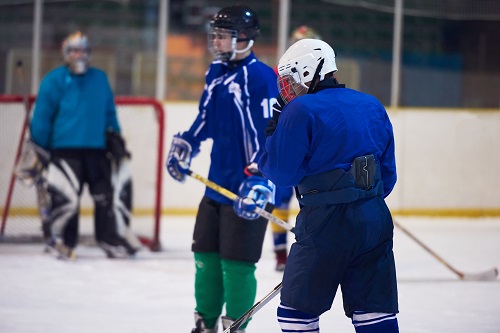
This summer, Tennessee State University became the first historically black college or university to begin a men’s ice hockey program at the collegiate level.
“Bringing ice hockey to Tennessee State University is a part of our continued commitment to provide our students with new opportunities and to broaden new interests in areas where they have traditionally had limited or no access,” TSU President Glenda Glover said in a statement. “We appreciate our ongoing partnership with the [National Hockey League’s] Nashville Predators, which has played a pivotal role in our decision to pursue this historic undertaking of starting an ice hockey program at TSU — and the first for an HBCU.”
The Tigers will begin play in 2024, beginning with a club-level program with the goal to achieve NCAA Division I status at both the men’s and women’s levels “in the near future.” The club hockey program will receive comprehensive oversight under the guidance of the Department of Athletics, ensuring a well-structured and successful implementation, the university said. A director of club hockey operations will oversee fundraising, seek corporate partnerships, recruit student-athletes and manage day-to-day operations.
The move, according to TSU Director of Athletics Mikki Allen, should help “dismantle barriers, diversify the game and propel hockey into a new era of inclusivity.” The National Hockey League, the NHL Players Association, the Nashville Predators and College Hockey Inc. all have played integral roles in the initiative.
Among the NHL’s 32 teams, only 54 active players in 2022 were Arab, Asian, Black, Latino or Indigenous, according to Kim Davis, the league’s executive vice president of social impact, growth initiatives and legislative affairs. That’s about 7 percent of the league, she told USA Today, which noted that “raising minority participation in management, coaching and officiating is part of a long-term plan executives hope changes the very face of hockey in the coming years.”
“Anybody that expects us to wave a magic wand and have these things happen immediately as opposed to over time, they don’t understand how real change works,” Davis told the paper. “What I’m encouraged by is the fact that our owners and our leaders of our 32 clubs and at the NHL level are committed to this. People are leaning into this. They understand that this is, as I often say, a movement not a moment, and it’s going to take us time to make the change. But we’re already seeing it.”
 Tennessee State and its partnership with the Predators is a perfect example. Another one can be seen in the Washington Capitals’ new Rising Stars Academy — a free co-ed program developed to help youth hockey players of color who compete in travel and high-level house hockey across the Washington, D.C., area to experience elite skills development and mentorship. The program also educates players and their families about the impact hockey can have on their lives and includes cooking demonstrations focused on healthy eating.
Tennessee State and its partnership with the Predators is a perfect example. Another one can be seen in the Washington Capitals’ new Rising Stars Academy — a free co-ed program developed to help youth hockey players of color who compete in travel and high-level house hockey across the Washington, D.C., area to experience elite skills development and mentorship. The program also educates players and their families about the impact hockey can have on their lives and includes cooking demonstrations focused on healthy eating.
According to the Capitals, 115 players — 97 boys and 18 girls between the ages of 9 and 17 — were accepted into the inaugural program. Participants identify as Asian, Black (or African American), Hispanic (or Latino), Native Hawaiian/Pacific Island Native and as “Two or More Races.” The academy was funded through the Capital Impact Fund, which was established in 2020 by the Capitals and Monumental Sports & Entertainment Foundation to provide grants to organizations that can assist in eliminating cost barriers faced by people of color in the hockey community. Organizers initially expected no more than 40 players to show up.
“To see this inclusion and to have coaches of color here; my son has never had an African American hockey coach, that’s amazing,” said Raveena Seeraj-Montague, mother of 15-year-old Braeden Montague, who is one of the academy’s inaugural participants. “It lets him know that he can do whatever his hockey dreams are and can accomplish them.”
Meanwhile, Good Morning, America in July featured the Mosaic Hockey Collective in Richfield, Minn. — a nonprofit organization focused on empowering players of color who compete in association hockey from the U6 to high school levels. “It’s [about] building relationships with other parents of color,” founder Meredith Lang told GMA correspondent Will Reeve. “Hockey can sometimes be an exclusive sport. And by coming together and sharing those resources, that’s how we’re actually building and growing diversity.”

